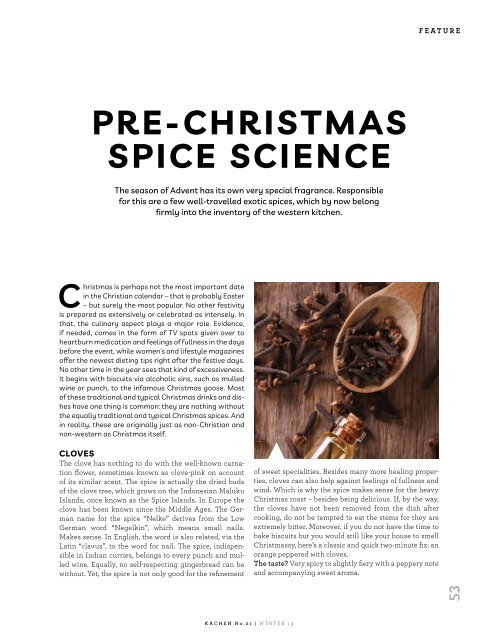KACHEN #21 (Winter 2019) English edition
- No tags were found...
Create successful ePaper yourself
Turn your PDF publications into a flip-book with our unique Google optimized e-Paper software.
FEATURE<br />
PRE-CHRISTMAS<br />
SPICE SCIENCE<br />
The season of Advent has its own very special fragrance. Responsible<br />
for this are a few well-travelled exotic spices, which by now belong<br />
firmly into the inventory of the western kitchen.<br />
Christmas is perhaps not the most important date<br />
in the Christian calendar – that is probably Easter<br />
– but surely the most popular. No other festivity<br />
is prepared as extensively or celebrated as intensely. In<br />
that, the culinary aspect plays a major role. Evidence,<br />
if needed, comes in the form of TV spots given over to<br />
heartburn medication and feelings of fullness in the days<br />
before the event, while women’s and lifestyle magazines<br />
offer the newest dieting tips right after the festive days.<br />
No other time in the year sees that kind of excessiveness.<br />
It begins with biscuits via alcoholic sins, such as mulled<br />
wine or punch, to the infamous Christmas goose. Most<br />
of these traditional and typical Christmas drinks and dishes<br />
have one thing is common: they are nothing without<br />
the equally traditional and typical Christmas spices. And<br />
in reality, these are originally just as non-Christian and<br />
non-western as Christmas itself.<br />
CLOVES<br />
The clove has nothing to do with the well-known carnation<br />
flower, sometimes known as clove-pink on account<br />
of its similar scent. The spice is actually the dried buds<br />
of the clove tree, which grows on the Indonesian Maluku<br />
Islands, once known as the Spice Islands. In Europe the<br />
clove has been known since the Middle Ages. The German<br />
name for the spice “Nelke” derives from the Low<br />
German word “Negelkin”, which means small nails.<br />
Makes sense. In <strong>English</strong>, the word is also related, via the<br />
Latin “clavus”, to the word for nail. The spice, indispensible<br />
in Indian curries, belongs to every punch and mulled<br />
wine. Equally, no self-respecting gingerbread can be<br />
without. Yet, the spice is not only good for the refinement<br />
of sweet specialities. Besides many more healing properties,<br />
cloves can also help against feelings of fullness and<br />
wind. Which is why the spice makes sense for the heavy<br />
Christmas roast – besides being delicious. If, by the way,<br />
the cloves have not been removed from the dish after<br />
cooking, do not be tempted to eat the stems for they are<br />
extremely bitter. Moreover, if you do not have the time to<br />
bake biscuits but you would still like your house to smell<br />
Christmassy, here’s a classic and quick two-minute fix: an<br />
orange peppered with cloves.<br />
The taste? Very spicy to slightly fiery with a peppery note<br />
and accompanying sweet aroma.<br />
53<br />
<strong>KACHEN</strong> No.21 | WINTER 19


















